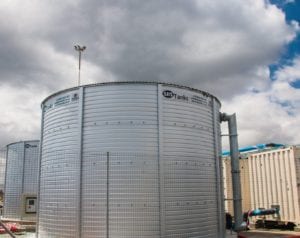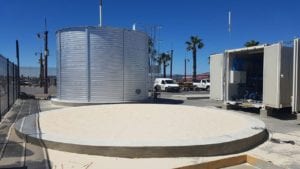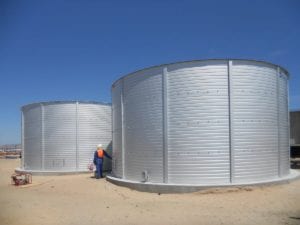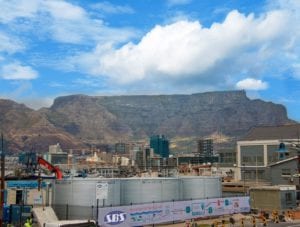The roll-out of a series of desalination plants has given Cape Town a new lease on life and a chance for the city’s depleted dams to bounce back from the extended drought.
Cape Town has become a hot topic for water engineering over the past 18 months. Scientists at UCT have said that this is the worst drought in Cape Town’s recorded history, and some have even gone so far as to label it a “once in a millennium” drought. Those are scary statements to take in. The reality: Cape Town is a case in point for the drastic impact climate change is having, and will continue to have, on the global population. And with our climates changing so significantly, we need the brightest minds in engineering to be focusing their efforts on new technology that will mitigate these serious repercussions. Quite possibly, the key focus area for innovative engineers is the water industry. We all know that water is life, and we’ve probably all heard the statement that “the next world war won’t be around oil, but around water”. Whether that’s true or not is beside the point. The point is that climate change is causing dramatic adjustments to our water sources, and we as the global community need to adjust our methods of storing and providing safe drinking water.
It has been quite interesting to watch the innovations popping up in the Western Cape from a 5ℓ water-saving pump-shower to a ‘drinkable book’ – a book of sterilisation sheets that sterilise and purify almost all forms of contaminated water. Then of course there is the surge in rainwater harvesting and borehole solutions as people and businesses alike seek to get off the grid and not rely on the dwindling dam supply. It is amazing to see first-hand just how crisis drives innovation, and long may the innovation continue.
As this global water crisis develops, municipal engineers and government officials would do well to take note of these innovations, and see where such water-centric approaches can be applied to their areas of jurisdiction. And do so before the effects of this crisis are felt first-hand within their regions.
One of the hot topics amidst the Cape Crisis is that of desalination. It makes obvious sense that when you’re surrounded by gigalitres of ocean water, you should do what you can to turn it into drinking water, especially if there are already thousands of case studies to not only work with, but improve upon as well.
Quite possibly, the key focus area for innovative engineers is the water industry. We all know that water is life, and we’ve probably all heard the statement that “the next world war won’t be around oil, but around water”. Whether that’s true or not is beside the point. The point is that climate change is causing dramatic adjustments to our water sources, and we as the global community need to adjust our methods of storing and providing safe drinking water.
It has been quite interesting to watch the innovations popping up in the Western Cape from a 5ℓ water-saving pump-shower to a ‘drinkable book’ – a book of sterilisation sheets that sterilise and purify almost all forms of contaminated water. Then of course there is the surge in rainwater harvesting and borehole solutions as people and businesses alike seek to get off the grid and not rely on the dwindling dam supply. It is amazing to see first-hand just how crisis drives innovation, and long may the innovation continue.
As this global water crisis develops, municipal engineers and government officials would do well to take note of these innovations, and see where such water-centric approaches can be applied to their areas of jurisdiction. And do so before the effects of this crisis are felt first-hand within their regions.
One of the hot topics amidst the Cape Crisis is that of desalination. It makes obvious sense that when you’re surrounded by gigalitres of ocean water, you should do what you can to turn it into drinking water, especially if there are already thousands of case studies to not only work with, but improve upon as well.
Containerised solution
A particularly attention-grabbing project was that of a containerised desalination plant on the V&A Waterfront docks. A hat-tip must go to the City of Cape Town who, as a municipality, was frantically exploring drought-mitigation options as the dreaded Day Zero quickly approached. It put the project out to tender, and awarded it to Quality Filtration Systems (QFS), based in Strand, Western Cape. QFS has a working relationship with Osmoflo of Australia, one of the world leaders in desalination and water recycling. This relationship, coupled with the City of Cape Town’s urgent need, led QFS to import an entirely containerised desalination plant directly from Osmoflo’s Dubai office.This plant is made up of seven standard shipping containers, each with an array of reverse osmosis desalination filters and media, all ready to ‘plug and play’. This unique containerised solution allowed the plant to be imported directly from Dubai within only thirty days, meaning the operation could be ready in a matter of weeks. The challenge, of course, was storage of the water itself.
 Tanks on the critical path
Tanks on the critical path
This is where South Africa’s leading water storage provider was able to put up its hand and respond to the need. The plant is able to produce 2 MLD of potable drinking water, pumped into the municipal water supply for the region. Those two megalitres need to be stored before being directed into the municipal lines and it was here that the choice of SBS Tanks® was a no-brainer.
The City of Cape Town would take nothing less than the best in storage and longevity, and bearing in mind that the deadline was a very tight two-month window, SBS Tanks® was the clear and obvious choice for the job of water storage. The plant needs three phases of water storage: the brine, the second-phase filtered water, and the final-stage potable water. Thus, three tanks were required. SBS Tanks® answered the call and was able to provide two ST09/04 tanks that each store 125 kℓ, and one ST11/04 capable of storing 186 kℓ.
These tanks are the perfect sizes for the application, and at 6.1 m (ST09/04s) and 7.5 m (ST11/04) in diameter, they didn’t take up considerable space in the parking lot provided for the project. And with each one standing a proud 4.2 m high, they look ready for serious use, but don’t overwhelm the urban environment of the area.
 With a total of 436 kℓ in gross water storage, one would imagine that these tanks would have quite a serious transport commitment and construction process. But with their innovative and advanced modular design, the tanks were delivered piece by piece, and installed by a humble team of six, who were able to have the first tank installed and ready for commissioning within a week.
With SABS, ISO and OHSAS certification, and a proudly South African manufacturing facility in KwaZulu-Natal, it is a project like this that proves the quality of SBS Tanks®. Able to deliver in remarkable turnaround times, with highest quality workmanship from manufacture to installation, and a built-to-last product that can go the distance, it’s no wonder companies like QFS choose SBS Tanks® for projects such as this at the City of Cape Town’s V&A Waterfront.
This desalination plant is one of many innovative solutions that showcase just what can be accomplished when our backs are against the wall to an impending water crisis. Water truly is life, and it is exciting to know that companies like these are hard at work ensuring all South Africans are provided with the highest quality drinking water possible.
With a total of 436 kℓ in gross water storage, one would imagine that these tanks would have quite a serious transport commitment and construction process. But with their innovative and advanced modular design, the tanks were delivered piece by piece, and installed by a humble team of six, who were able to have the first tank installed and ready for commissioning within a week.
With SABS, ISO and OHSAS certification, and a proudly South African manufacturing facility in KwaZulu-Natal, it is a project like this that proves the quality of SBS Tanks®. Able to deliver in remarkable turnaround times, with highest quality workmanship from manufacture to installation, and a built-to-last product that can go the distance, it’s no wonder companies like QFS choose SBS Tanks® for projects such as this at the City of Cape Town’s V&A Waterfront.
This desalination plant is one of many innovative solutions that showcase just what can be accomplished when our backs are against the wall to an impending water crisis. Water truly is life, and it is exciting to know that companies like these are hard at work ensuring all South Africans are provided with the highest quality drinking water possible.







